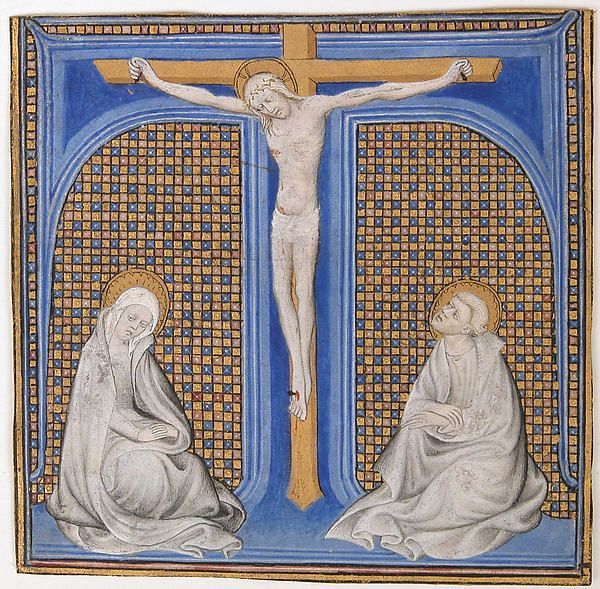Death and Eternity
Prayer: In the preparatory prayer I will beg God our Lord for grace that all my intentions, actions, and operations may be directed purely to the praise and service of his Divine Majesty.
First Prelude: this is a representation of the place. Here it will be to see in my imagination the length, breadth, and depth of hell.
Second Prelude: I should ask for what I desire. Here it will be to beg for a deep sense of the pain, which the lost suffer, that if because of my faults I forget the love of the eternal Lord, at least the fear of these punishments will keep me from falling into sin.
One day, Our Lady, looking sadder told them, Pray, pray very much, and make sacrifices for sinners, for many souls go to hell because they have no one to make sacrifices and pray for them.
Then Lucy relates that they were following a path and they found a piece of rope. Lucy took it and attached it to one of his arms. And she says, “I did not take long to notice that the rope hurt me. I then said to my cousins: ‘Look that hurts! We could attach it around our waist and offer this sacrifice to God. Francisco and Jacinta accepted her idea, and then they shared that rope. Sometimes Jacinta shed some tears because of the discomfort, which the rope caused her. I told her on several occasions to take it off, and she replied, ‘No! I want to offer this sacrifice to our Lord in reparation and for the conversion of sinners.”
Real and shameful! Lucy 9 years old, Francisco 8 years old, and Jacinta 6 years old, and they know very, very well the meaning of Heaven and the meaning of hell, the value of eternity and the value of sacrifice.
God’s Justice
God is just in his awards. He rewards the upright with the glory of Heaven, and punishes the wicked with the eternal pains of hell.
We have seen how man was created to love and serve God. Now, when he sins, he does not love or serve God, and therefore he comes under sentence of eternal punishment in hell.
How can God punish with eternal torments, a sin that lasts a moment? A crime is measured not by its duration, but by the enormity of its malice. The malice of mortal sin is, as Saint Thomas Aquinas says, infinite. (I-II, q. 87, art 4)
Because the malice of sin is not measured by the sinner; but it is measured by God, who is offended. God is infinite. Consequently, the punishment is infinite.
In sin there are found five evils of malice:
- The first evil is the contempt with which the sinner treats God. On this account he deserves to be punished with the pain of loss, the loss of what he has made disdained and he suffers the deprivation of the sight of God. Then, the very end of his life will never be reached.
- The second evil is his act of rebellion from God, which is an abuse of freedom. Therefore, he deserves to be punished by losing his liberty and suffering slavery and subjection to Satan. Because he did not serve God, the Lord, in hunger and thirst, in nakedness and in want of all things he will serve the enemy.
- The third evil is the over-fondness or affection for created objects for which he sinned. Then, a created object, which is fire, will cause his torment, and this is called a pain of sense.
- The fourth evil is a sensual or spiritual satisfaction that the sinner finds in sin; then he deserves to be tormented with a corresponding dissatisfaction, as God commands, “Render to her as she herself has rendered, and repay her double for her deeds…As much as she glorified herself and lived in delicacies, so much torment and mourning give her.” (Rev. 18: 6-7)
- The fifth evil is pride, which consists in man wanting to be happy of himself, independent of God. Therefore, in hell he finds humiliation and confusion.
Eternity
A sinner in hell is found obstinate in his evil dispositions, like a rock; then, the duration of his sufferings is eternal.
This is the truth that has made even the greatest saints tremble. When Thomas More was condemned to death by Henry the Eighth, his wife Louisa went to him for the purpose of tempting him to obey the royal command. Tell me Louisa –replied the holy man- how many years can I, who am now so old, expect to live? You might –she said- live for twenty years. O foolish woman! –he exclaimed- do you want me to condemn my soul to an eternity of torments, for twenty years of life?
The thought of eternity is a great thought: so, it was called by Saint Augustine in this way – Magna cogitatio (the great thought)
In this eternity the house of the just will be a palace of delights, a kingdom of peace. On the contrary, the house of sinners will be a prison of torments. Into one of these two houses each of us must certainly go.
Saint Ambrose says, “Into this or that eternity I must fall.”
And where the soul goes, there she will remain forever. The book of Ecclesiastes says, “if a tree falls to the south or to the north, in the place where the tree falls, there it will lie.” (11: 3)
To those who enter hell, the door opens for their admission, but never opens for their departure. If a condemned soul heard that she was to be release from hell after so many millions of years, hell would not be hell.
But all these millions of years will be multiplied an infinite number of times, and hell will begin again.
And all the torments will never end, and they will never be diminished in the smallest degree. Saint Cyprian says, “In eternity there is no change, because the decree is immutable.”
The Holy Scripture says in many places that the punishment will be eternal:
“And these –says Christ- shall go into everlasting punishment.” (Mt. 25: 46)
“Depart from me, you cursed, into everlasting fire.” (Mt 25: 41)
Saint Paul affirms, “They shall suffer eternal punishment in destruction.” (2 Thess 1: 9)
And in the book of Revelation, “And the smoke of their torments shall ascend up forever and ever.” (Rev. 14, 11)
This is not a matter of little importance
Sin is a matter of eternal importance to us. The devil knows that the last moments are the most important moments in our lives.
Before dying, Saint Martin of Tours saw the devil standing near his bed, and he cried, “Why do you stand there, you bloodthirsty animal? Murderer, you will not have me for your prey…”
The devil, according to Saint Peter, is a lion that is continually going about roaring, looking for whom he may devour. (1 Peter, 5: 8)
The temptations of the devil, the persecution of men, and the adversity that we suffer in this world are not evils. On the contrary we can say that they are advantages, if we know how to make of them the use which God wishes. It is in the battlefield where the soldier can show his virtues. It is in this earthly battlefield where we can manifest our love for God and his precepts.
It is beautiful to see how eternity was a matter of great importance for the seven Maccabees sons and their mother.
When they were arrested, one of them, acting as their spokesman, said, “What do you intend to ask and learn from us? For we are ready to die rather than transgress the laws of our fathers.”
He died first, meanwhile his brothers and their mother encouraged one another to die, saying, “The Lord God is watching over us…”
After the first brother they brought forward the second. And when he was at his last breath, he said, “You dismiss us from this present life, but the King of the universe will raise us up to an everlasting renewal of life…”
After him, the third was the victim. Then, he quickly put out his tongue and courageously stretched forth his hands, and said, “I got these from Heaven, and because of his laws I disdain them, and from him I hope to get them back again.”
When he too had died, they tortured the fourth in the same way. And when he was near death, he said, “One cannot but choose to die at the hands of men and to cherish the hope that God gives of being raised again by him. But for you there will be no resurrection to life!”
Next, they brought forward the fifth. He looked at the king, and said, “Because you have authority among men, mortal though you are, you do what you please… Keep on, and see how his mighty power will torture you and your descendants!”
After him they brought forward the sixth. And when he was about to die, he said, “Do not deceive yourself in vain. We are suffering these things on our own account, because of our sins against our own God. But do not think that you will go unpunished for having tried to fight against God!”
The king called the mother and asked her to advise the youngest to save himself. But, she said to his son in their native tongue: “My son, have pity on me. I carried you nine months in my womb, and nursed you for three years, and have brought you up to this point in your life, and have taken care of you. I beseech you, my child, do not fear this butcher, but prove worthy of your brothers. Accept death, so that in God’s mercy I may get you back again with your brothers.”
While she was still speaking, the young man said, “What are you waiting for? I will not obey the king’s command, but I obey the command of the law that was given to our fathers through Moses.” Last of all, the mother died, after her sons. (2 Maccabees 7)
In the middle of our sufferings and temptations, looking at the eternal life, we can remember the words of Saint Paul, “In your struggle against sin you have not yet resisted to the point of shedding your blood.” (Heb 12: 4)
Colloquy
Enter into conversation with Christ our Lord. Recall to memory that of those who are in hell, some went there because they did not believe in the coming of Christ; others, though they believed, because they did not keep the Commandments.
I will give thanks to God our Lord that He has not put an end to my life and permitted me to fall into any of these two classes.
I will also thank him because up to this moment He has shown himself so loving and merciful. Close with an Our Father.

Take, Lord,
and receive all my liberty, my memory, my understanding, and my entire will, all that I have and possess. Thou hast given all to me. To Thee, O Lord, I return it. All is Thine, dispose of it wholly according to Thy will. Give me Thy love and Thy grace, for this is sufficient for me.
(Spiritual Exercises #234. Louis Puhl SJ, Translation.)



